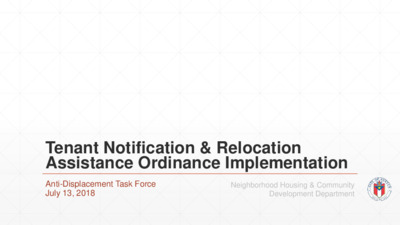ADTF_TRAO_Presentation_071318 — original pdf
Backup

Tenant Notification & Relocation Assistance Ordinance ImplementationAnti-Displacement Task ForceJuly 13, 2018Neighborhood Housing & Community Development Department Overview▪Background & ordinances in other cities▪Overview of Austin’s ordinance▪How many times has the ordinance been used?▪What does implementation look like?▪Next steps: financial assistance & offenses reassessment▪Feedback & evaluation2 What is the Tenant Notification & Relocation Assistance Program? Why do we need it?▪Redevelopment of several multifamily properties & mobile home parks has resulted in tenant displacement over the last several years▪Displacement can have destabilizing effects on the most vulnerable in our city, including elderly, low-income, or disabled households▪City policy can provide clear and equitably applied expectations for developers with the goal of mitigating the negative impacts of displacement on our most vulnerable residents▪Other cities have notificationand financial relocation assistance requirements that are triggered under certain circumstances when a property owner wants to make changes to a multifamily or mobile home property that will result in displacement of current tenants3 Ordinances in other cities▪From a survey of 21 programs across the country:▪Typical characteristics for multifamily programs: ▪Typically, property owners/landlords pay costs of relocation ▪Financial assistance is often tied to income-eligibility with additional assistance for elderly, disabled, or family households▪Amounts are often calculated using city fair market rents (California) or average relocation costs▪Amounts range from $390 to $10,300 depending on furnishings, income, and length of tenancy▪Applicability ranges from projects receiving City funding to any demolition, alteration, or rehab that causes displacement to land use/condo conversions▪Permits or licenses are held to enforce requirements▪Notice periods range from 60 days to 1 year▪Typical characteristics for mobile home programs:▪Government entities (mobile home relocation trust funds) often pay relocation costs▪Financial assistance amounts range from $1,250 to $12,000 or actual relocation expenses▪Notice periods range from 90 days to 1 year4 Ordinances in other cities▪Helpful elements found in other cities:▪For multifamily:▪Just-cause eviction protections▪City-wide fair market rent information▪For mobile homes:▪State-run mobile home trust funds5 Austin’s Tenant Notification & Relocation Assistance Ordinance▪Provides notification to residents of multifamily and mobile home park developments slated for closure due to redevelopment; allows for financial relocation assistance to be provided to income-eligible residents▪Notice of intent period: 120 days for multifamily; 270 days for mobile home residents▪Applies to multifamily properties or mobile home parks of 5 or more households▪Triggered by development permit applications:▪For multifamily properties:▪Demolition Permits▪Commercial Building Permits that authorize demolition▪For mobile home parks:▪Zoning Applications▪Site Plan Applications6 How many times has the ordinance triggered notification?▪3Multifamily Properties, totaling approximately 90 households▪1 Mobile Home Park of 41 households▪Anecdotal information of leases ending/being terminated due to redevelopment has occasionally been forwarded to Neighborhood Housing, but the properties in question did not have any triggering permit applications submitted, therefore the ordinance did not apply. (~ 4 instances)7 Ordinance ImplementationApplicationStep 1NotificationStep 2Certification Letter IssuedStep 3Approvals Occur at End of Notice PeriodStep 41.Applicant fills out permit application and notes whether 5 or more households currently occupy the property.2.Application indicates follow-up may be necessary –applicant reaches out to Neighborhood Housing for appropriate forms & procedure, which are available online.3.After notice is delivered properly and documentation is submitted, Neighborhood Housing provides applicant with certification letter. Applicant submits this letter to development reviewer.4.Development permit cannot be approved until the end of the notice period, as indicated on the certification letter.8 Next Steps: Financial Assistance▪Ordinance authorizes City Council to charge a relocation assistance fee for certain development projects that displace income-eligible tenants▪To set this fee, a nexus study must be conducted to 1) determine a relationship between redevelopment and the need for a relocation fee and 2) ensure proposed fee amounts are proportionate to the impact of the redevelopment▪Funding was not allocated in FY17-18 City budget for nexus study. Once funding is identified, the Request for Proposals can be issued. NHCD included funding for study in FY 18-19 budget proposal.▪Ordinance also allows for City Council to appropriate City funds for relocation assistance. Funding for relocation assistance was not identified in FY17-18 budget.▪Therefore, only the notification requirements are currently being implemented.9 Next Steps: Reassessment of Offenses▪Ordinance directed staff to re-solicit input from stakeholders on Offenses section:▪Whether penalty amount should be calculated based on number of units or number of multifamily buildings/mobile home parks▪Whether proof of a culpable mental state should be required to prosecute a violation of the ordinance▪Limited stakeholder responses indicate support for doing away with requirement for proof of culpable mental state; feedback on calculation of penalty amount was more mixed▪CodeNEXT Draft 3 includes recommendation to remove proof of culpable mental state10 Feedback & Evaluation▪Neighborhood Housing has received feedback on the following aspects of the ordinance:▪Concern with how requirements are triggered –if leases end before permit application is submitted, ordinance does not apply▪Codes & Ordinances Joint Committee discussed this issue at January meeting▪Santa Barbara, CA ordinance includes a 6-month look back period –tenants who resided at property in last 6 months before application submittal are considered eligible for assistance▪Safety can be a concern as developments empty of residents▪Financial assistance is needed; it should be paired with knowledgeable housing locators to help households find new homes▪Relocating mobile home park residents will be increasingly difficult as existing parks redevelop. Successful relocation requires skillful movers and parks willing to accept older mobile homes, or replacement homes that are newer11 Feedback & Evaluation▪The ordinance is providing substantial notice to tenants when triggered. ▪It is not yet providing financial assistance to low-income tenants, due to lack of funding and nexus study.▪The reliance on development permits as triggers means the ordinance is not triggered every time a property sends notices of non-renewal to its tenants.▪Ultimately, the lack of comparable places to move means tenants still face difficulties associated with relocation.12 For more information:www.austintexas.gov/page/tenant-relocation-assistanceLauren Avioli, Neighborhood Housing & Community Developmentlauren.avioli@austintexas.gov| 512-974-314113